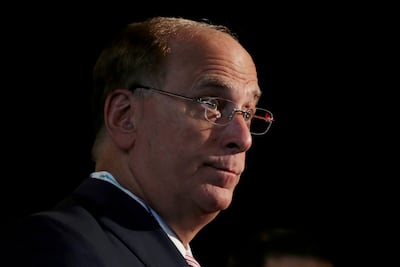The top executives of major Wall Street banks and global investment managers with trillions of dollar under management say the current geopolitical conflicts, a ballooning US budget deficit and high interest rates can further dent the already slowing global economy.
Ray Dalio, the founder of Bridgewater Associates, a hedge fund with about $125 billion in assets, said he was pessimistic about the global economy in 2024.
“If you take the time horizon, the monetary policies that we're going to see and so on will have greater effects on the world,” Mr Dalio said during a panel session at the Future Investment Initiative on Tuesday in Riyadh, Saudi Arabia.
“If we can keep the peace [and] if we can have a healthy competitive environment without having a war with each other, we will be in good shape,” he said.

The Israel-Gaza war, which has spiralled into a major humanitarian crisis, has created further uncertainty for a global economy that is feeling the effects of stubborn inflation and high borrowing costs.
Citigroup chief executive Jane Fraser said it was “hard not to be pessimistic” under the current circumstances.
“With the backdrop … of the aftermath of the terrorist attack in Israel and the events that have been unfolding since then, it's desperately sad,” Ms Fraser said.
Larry Fink, chief executive of the world’s largest asset manager BlackRock, expects higher interest rates to linger and said the US economy would not have “hard or soft landing” next year.
“The amount of fiscal stimulus that is just entering the economy ... is very inflationary,” Mr Fink said.
America’s national debt, which equals the amount of money borrowed by the federal government to cover operating expenses, hit $33.04 trillion last month.
Last week, US Federal Reserve chairman Jerome Powell suggested that the central bank was inclined to hold interest rates steady again at its November meeting while leaving open the possibility of a future increase if policymakers see further signs of resilient economic growth.
The Fed has raised interest rates 11 times to its current range of 5.25 per cent to 5.5 per cent in an effort to rein in price increases without driving the economy into a recession.

Goldman Sachs chairman and chief executive David Solomon said he was “uncertain” about the mergers and acquisitions market currently, but expects activity to pick up in tandem with economic growth.
“As people become more certain in the environment, they have to move forward and continue consolidation [and] scale to compete effectively,” Mr Solomon said.
The post-coronavirus boom in M&A activity was driven by fiscal stimulus efforts aimed at reviving growth, he said.
HSBC chief executive Noel Quinn said Europe, which was hit hard by Russia’s invasion of Ukraine last year, would struggle with near-term and potentially medium-term growth.
“It [Europe] will get inflation under control although there is the potential for a second wave. Wage inflation is still not under control in Europe and, particularly, in the UK,” he said.
China, the world’s second-largest economy, is facing near-term pressures as it has corrected its economy with stimulus measures, he said.
“[In the] medium term, I'm still very confident [about] the growth opportunities in China.”

Standard Chartered chief executive Bill Winters said interest rates that remained higher for longer "almost certainly means a stronger dollar for longer", which would not bode well for borrowers and economic momentum.
"That combination of higher interest rates and a stronger dollar is very tough for any non-US company or country that has borrowed in US dollars," he told FII delegates at a separate panel discussion.
"We've seen a few countries restructure [debt] already and there are a few more that have been fighting it off very bravely. But the pressure mounts as time goes by."
The Fed is keeping interest rates high because it is "trying to depress economic activity in order to bring inflation down, so inevitably, we're going to have a slower economic downturn in the US".
"Let's just hope, and I think there's a reasonable case to be made, that China will be re-emerging at that point as a growth engine ... to offset some of the inevitable slowness in the US and Europe," Mr Winters said.
He said it would be very difficult to achieve the last mile of bringing inflation down to the Fed's target range of 2 per cent and the regulator will have to make a judgment call at that point to see if it is worth slowing the economy down.
"You have to look at the cost," he said. "To get from 2.5 [per cent] to 2 per cent what's going to have to happen? Do you have to generate a recession? It may not be worthwhile."

